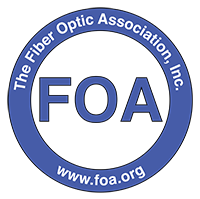Professional certification, trade certification, or professional designation, often called simply certification or qualification, is a designation earned by a person to assure qualification to perform a job or task. Not all certifications that use post-nominal letters are an acknowledgement of educational achievement, or an agency appointed to safeguard the public interest.

Recreational diver training is the process of developing knowledge and understanding of the basic principles, and the skills and procedures for the use of scuba equipment so that the diver is able to dive for recreational purposes with acceptable risk using the type of equipment and in similar conditions to those experienced during training.
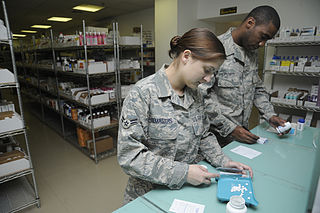
A pharmacy technician performs pharmacy-related functions. Training, certification, licensing, and actual practice of pharmacy technicians varies not only worldwide but in some countries regionally as well as by employer.

A surgical technologist, also called a scrub, scrub tech, surgical technician, or operating department practitioner or operating room technician, is an allied health professional working as a part of the team delivering surgical care. Surgical technologists are members of the surgical team. The members of the team include the surgeon, surgeon's assistant, circulator nurse and anesthesia provider. They possess knowledge and skills in sterile and aseptic techniques. There are few mandatory professional requirements for surgical technologists, and the scope of practice varies widely across countries and jurisdictions. Surgical technologists attend junior colleges and technical schools, and many are trained in military schools. In the military they perform the duties of both the circulator and the scrub. The goal is for surgical technologists to be able to anticipate the next move the surgeon is going to make in order to make the procedure as smooth and efficient as possible. They do this by having knowledge of hundreds of surgical procedures and the steps the surgeon needs to take in order to complete the procedure, including the very wide range of surgical instruments they may need. Specialties can include, but are not limited to, the following: genitourinary, obstetrics and gynaecology, urology, ENT, plastics, general, orthopedics, neurology, and cardiovascular. They only work in surgical or perioperative areas and are highly specialized. Surgical technologist is the proper term for a two-year program which earns a degree in applied sciences. The profession is up and coming and highly in demand.
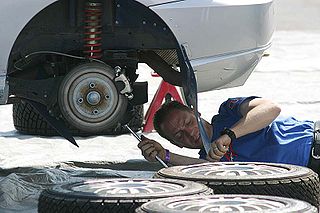
An auto mechanic is a mechanic who services and repairs automobiles, sometimes specializing in one or more automobile brands or sometimes working with any brand. In fixing cars, their main role is to diagnose and repair the problem accurately and quickly. Seasoned auto repair shops start with a (Digital) Inspection to determine the vehicle conditions, independent of the customers concern. Based on the concern, the inspection results and preventative maintenance needs, the mechanic/technician returns the findings to the service advisor who then gets approval for any or all of the proposed work. The approved work will be assigned to the mechanic on a work order. Their work may involve the repair of a specific part or the replacement of one or more parts as assemblies. Basic vehicle maintenance is a fundamental part of a mechanic's work in modern industrialized countries, while in others they are only consulted when a vehicle is already showing signs of malfunction.
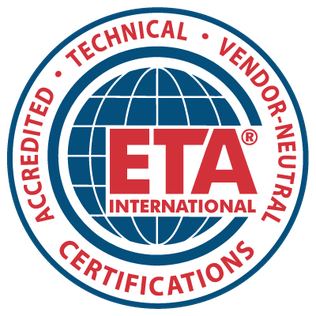
The Electronics Technicians Association, International, Inc. is a US-based not-for-profit 501(c)(6) trade association founded in 1978. The association provides certifications in industries such as basic electronics, fiber optics and data cabling, renewable energy, information technology, photonics and precision optics, customer service, biomedical, avionics, wireless communications, radar, and smart home. ETA is also one of the 12 COLEMs for U.S. Federal Communications Commission (FCC) testing. ETA works with technicians, educators, and military personnel. ETA also partners with companies such as Motorola Solutions to provide certification to their employees.
Following is a partial list of professional certifications in financial services, with an overview of the educational and continuing requirements for each; see Professional certification § Accountancy, auditing and finance and Category:Professional certification in finance for all articles. As the field of finance has increased in complexity in recent years, the number of available designations has grown, and, correspondingly, some will have more recognition than others. Note that in the US, many state securities and insurance regulators do not allow financial professionals to use a designation — in particular a "senior" designation — unless it has been accredited by either the American National Standards Institute or the National Commission for Certifying Agencies.

ATA College, formerly known as Advanced TrainingAssociates, is a private college in El Cajon, California. ATA College is accredited by the Council on Occupational Education (COE) and approved by the Bureau of Private Post-Secondary Education. The institute is also approved to participate in Federal financial aid programs by the Department of Education for students who qualify. The school provides training to the military and has been a Department of Defense contractor for vocational education since 1996. Tuition Assistance and Veterans Benefits can be used at ATA College. The institute is an approved training center by the Fiber Optic Association.

Scuba Diving International (SDI) is a Scuba training and certification agency. It is the recreational arm of Technical Diving International, a technical diver training organization.
Apple certification programs are IT professional certifications for Apple Inc. products. They are designed to create a high level of technical proficiency among Macintosh service technicians, help desk support, technical support, system administrators, and professional users. Apple certification exams are offered at Prometric testing centers and Apple Authorized Training Centers, as well as online through Pearson Vue.

ACUC, American and Canadian Underwater Certifications Inc. is an international recreational diving membership and diver training organization. Formerly known as the Association of Canadian Underwater Councils, it was formed as a not for profit collective of regional dive councils to create a national forum for their common interest and concerns. It soon began developing a training curriculum better suited to the Canadian conditions that many other training agencies neglected. It was later incorporated in 1986 in Canada by Robert Cronkwright. Cronkwright was a National Association of Underwater Instructors (NAUI) instructor from 1969 to 1971. In 1971 he crossed over to the Association of Canadian Underwater Councils and became a Training Director, Secretary/Treasurer and later Vice President of the Association (1972–1984). He was also Training Director for the Ontario Underwater Council (OUC) in the 1970s.
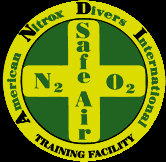
American Nitrox Divers International was founded by Ed Betts and Dick Rutkowski in 1988.
The International Association for Handicapped Divers is a non-profit organization with its headquarters in Middenmeer, the Netherlands. The organization was established in 1993, with the aim to promote, develop and conduct programs for the training in scuba diving of people with a disability. From 1993 to date (2008) IAHD have educated and certified over 5500 divers and dive professionals worldwide. As the IAHD is a non-profit foundation, all the people on the board are volunteers. There are also volunteers in regions around the world.
The Biofeedback Certification International Alliance (BCIA) is an organization that issues certificates for biofeedback, which is "gaining awareness of biological processes".
The Computing Technology Industry Association, more commonly known as CompTIA, is an American non-profit trade association that issues professional certifications for the information technology (IT) industry. It is considered one of the IT industry's top trade associations.

The United States Navy job rating of electronics technician (ET) is a designation given by the Bureau of Naval Personnel (BUPERS) to enlisted members who satisfactorily complete initial Electronics Technician "A" school training.
HPE Networking offers trainings, typically delivered in HP Authorized Trainings Centers (ATCs) by HP Certified Instructors (HPCI).

Diver training is the set of processes through which a person learns the necessary and desirable skills to safely dive underwater within the scope of the diver training standard relevant to the specific training programme. Most diver training follows procedures and schedules laid down in the associated training standard, in a formal training programme, and includes relevant foundational knowledge of the underlying theory, including some basic physics, physiology and environmental information, practical skills training in the selection and safe use of the associated equipment in the specified underwater environment, and assessment of the required skills and knowledge deemed necessary by the certification agency to allow the newly certified diver to dive within the specified range of conditions at an acceptable level of risk. Recognition of prior learning is allowed in some training standards.
Recreational scuba certification levels are the levels of skill represented by recreational scuba certification. Each certification level is associated with a specific training standard published by the certification agency, and a training programme associated with the standard., though in some cases recognition of prior learning can apply. These levels of skill can be categorised in several ways:
